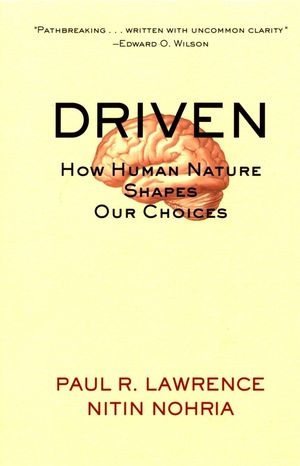Driven: How Human Nature Shapes Our ChoicesISBN: 978-0-7879-6385-9
Paperback
352 pages
September 2002, Jossey-Bass
 This is a Print-on-Demand title. It will be printed specifically to fill your order. Please allow an additional 10-15 days delivery time. The book is not returnable.
|
||||||
A touchstone for understanding how we behave on the job
"This is a stimulating and provocative book in bringing together important ideas from different fields, and, thereby, giving us a whole new slant on 'human nature.'" --Edgar H. Schein, Sloan Fellows Professor of Management Emeritus and Senior Lecturer, MIT
In this astonishing, provocative, and solidly researched book, two Harvard Business School professors synthesize 200 years of thought along with the latest research drawn from the biological and social sciences to propose a new theory, a unified synthesis of human nature. Paul Lawrence and Nitin Nohria have studied the way people behave in that most fascinating arena of human behavior-the workplace-and from their work they produce a book that examines the four separate and distinct emotive drives that guide human behavior and influence the choices people make: the drives to acquire, bond, learn, and defend. They ultimately show that, just as advances in information technology have spurred the New Economy in the last quarter of the twentieth century, current advances in biology will be the key to understanding humans and organizations in the new millennium.
"This is a stimulating and provocative book in bringing together important ideas from different fields, and, thereby, giving us a whole new slant on 'human nature.'" --Edgar H. Schein, Sloan Fellows Professor of Management Emeritus and Senior Lecturer, MIT
In this astonishing, provocative, and solidly researched book, two Harvard Business School professors synthesize 200 years of thought along with the latest research drawn from the biological and social sciences to propose a new theory, a unified synthesis of human nature. Paul Lawrence and Nitin Nohria have studied the way people behave in that most fascinating arena of human behavior-the workplace-and from their work they produce a book that examines the four separate and distinct emotive drives that guide human behavior and influence the choices people make: the drives to acquire, bond, learn, and defend. They ultimately show that, just as advances in information technology have spurred the New Economy in the last quarter of the twentieth century, current advances in biology will be the key to understanding humans and organizations in the new millennium.



